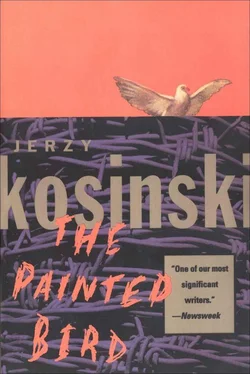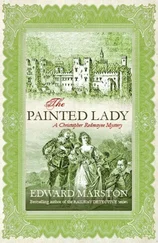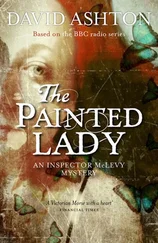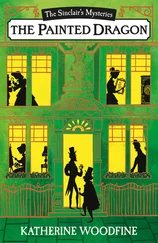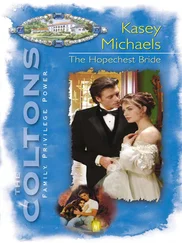Jerzy Kosiński - The Painted Bird
Здесь есть возможность читать онлайн «Jerzy Kosiński - The Painted Bird» весь текст электронной книги совершенно бесплатно (целиком полную версию без сокращений). В некоторых случаях можно слушать аудио, скачать через торрент в формате fb2 и присутствует краткое содержание. Год выпуска: 1965, ISBN: 1965, Жанр: Детская проза, на английском языке. Описание произведения, (предисловие) а так же отзывы посетителей доступны на портале библиотеки ЛибКат.
- Название:The Painted Bird
- Автор:
- Жанр:
- Год:1965
- ISBN:978-0-8021-9575-3
- Рейтинг книги:4 / 5. Голосов: 1
-
Избранное:Добавить в избранное
- Отзывы:
-
Ваша оценка:
- 80
- 1
- 2
- 3
- 4
- 5
The Painted Bird: краткое содержание, описание и аннотация
Предлагаем к чтению аннотацию, описание, краткое содержание или предисловие (зависит от того, что написал сам автор книги «The Painted Bird»). Если вы не нашли необходимую информацию о книге — напишите в комментариях, мы постараемся отыскать её.
The Painted Bird — читать онлайн бесплатно полную книгу (весь текст) целиком
Ниже представлен текст книги, разбитый по страницам. Система сохранения места последней прочитанной страницы, позволяет с удобством читать онлайн бесплатно книгу «The Painted Bird», без необходимости каждый раз заново искать на чём Вы остановились. Поставьте закладку, и сможете в любой момент перейти на страницу, на которой закончили чтение.
Интервал:
Закладка:
On the military ladder one’s position was determined by rank and function in the regiment. A veteran Party member had to obey explicitly the orders of his commander, who might not even be a Party member. Later at a Party meeting he could criticize this same commander’s activities and, if his charges were supported by other Party members, he might cause the transfer of the commander to a lower post. Sometimes the reverse was true. A commander might punish an officer who belonged to the Party, and the Party might further demote the officer in its hierarchy.
I felt lost in this maze. In the world into which Gavrila was initiating me, human aspirations and expectations were entangled with each other like the roots and branches of great trees in a thick forest, each tree struggling for more moisture from the soil and more sunshine from the sky.
I was worried. What would happen to me when I grew up? How would I look when seen through the many eyes of the Party? What was my deepest core: a healthy core like that of a fresh apple, or a rotten one like the maggoty stone of a withered plum?
What would happen if the others, the collective, decided that I was best suited for deep-water diving, for example? Would it matter that I was terrified of water because every plunge reminded me of my near-drowning under the ice? The group might think that it had been a valuable experience, qualifying me to train for diving. Instead of becoming an inventor of fuses I would have to spend the rest of my life as a diver, hating the very sight of water, panic-stricken before each dive. What would happen in that case? How can an individual, Gavrila asked, presume to put his judgment ahead of that of the many?
I absorbed Gavrila’s every word, writing questions which I wanted answered on the slate he had given me. I listened to the soldiers’ conversations before and after the meetings; I eavesdropped on the meetings through the canvas walls of the tent.
The life of these Soviet grownups was not very easy. Maybe it was just as hard as wandering from one village to the next, and being taken for a Gypsy. A man had many paths from which to choose, many roads and highways across the country of life. Some were dead ends, others led to swamps, to dangerous traps and snares. In Gavrila’s world only the Party knew the right paths and the right destination.
I tried to memorize Gavrila’s teaching, not to lose a single word. He maintained that to be happy and useful one should join the march of the working people, keeping in step with the others in the place assigned in the column. Pushing too close to the head of the column was as bad as lagging behind. It could mean loss of contact with the masses, and would lead to decadence and degeneracy. Every stumble could slow down the whole column, and those who fell risked being trampled on by the others . . .
17
In the late afternoon crowds of peasants came from the villages. They brought fruit and vegetables in exchange for the rich canned pork sent to the Red Army all the way from America, for shoes, or for a piece of tent canvas suitable for making into a pair of trousers or a jacket.
As the soldiers were finishing their afternoon duties, one heard accordion music and singing here and there. The peasants listened intently to the songs, barely understanding their words. Some of the peasants joined boldly and loudly in the song. Others appeared alarmed, suspiciously watching the faces of their neighbors who displayed such sudden and unexpected affection for the Red Army.
Women came from the villages in increasing numbers, together with their men. Many of them flirted openly with the soldiers, trying to lure them in the direction of their husbands or brothers who were trading a few steps away. Ashen-haired and light-eyed, they pulled down their ragged blouses and hiked up their worn skirts with a casual air, swinging their hips as they strolled around. The soldiers came closer, bringing from their tents bright cans of American pork and beef, packets of tobacco and paper for rolling cigarettes. Disregarding the presence of the men, they looked deep into the women’s eyes, accidentally brushing against their buxom bodies and breathing in their odor.
Soldiers occasionally sneaked out of the camp and visited the villages to continue trade with the farmers and meet village girls. The command of the regiment did its best to prevent such planned secret contacts with the population. The political officers, the battalion commanders, and even the divisional newssheets warned the soldiers against such individual escapades. They pointed out that some of the wealthier farmers were under the influence of the nationalist partisans who roamed the forests in an attempt to slow down the victorious march of the Soviet Army and to prevent the approaching triumph of a government of workers and peasants. They indicated that men from other regiments returned from such excursions severely beaten, and that some had disappeared altogether.
One day, however, a few soldiers disregarded the risk of punishment and managed to slip out of the camp. The guards pretended not to notice. Life in the camp was monotonous and the soldiers, waiting for departure or action, were desperate for some entertainment. Mitka the Cuckoo knew about this outing of his friends and he might even have gone with them if he had not been crippled. He often said that since the Red Army soldiers risked their lives for these local people by fighting the Nazis, there was no reason to avoid their company.
Mitka had been looking after me ever since I entered the regimental hospital. Thanks to his feeding I gained weight. Mitka fished out of the great caldron the best pieces of meat, and skimmed the fat off the soup for me. He also assisted at my painful injections, boosting my courage before medical examinations. Once when I got indigestion from overeating, Mitka sat with me for two days, holding my head when I vomited and wiping my face with a wet cloth.
While Gavrila taught me serious things, explaining the role of the Party, Mitka introduced me to poetry and sang me songs, strumming an accompaniment on his guitar. It was Mitka who took me to the regimental cinema and carefully explained the films. I went with him to watch the mechanics repairing the engines of the powerful Army trucks, and it was Mitka who took me to see the sharpshooters in training.
Mitka was one of the best liked and respected men in the regiment. He had a fine military record. On special Army days one could see decorations on his faded uniform which would be the envy of regimental or even divisional commanders. Mitka was a Hero of the Soviet Union, the highest military honor, and was one of the most decorated men in the whole division.
His feats as a sharpshooter were described in newspapers and books for children and adults. He was featured several times in newsreels seen by millions of Soviet citizens on collective farms and in factories. The regiment took great pride in Mitka; he was photographed for the divisional newssheets and interviewed by correspondents.
Soldiers often told tales at the evening campfire about the dangerous missions he had undertaken only a year earlier. They discussed endlessly his heroic actions in the rear of the enemy, where he parachuted in alone and then sniped at officers and couriers of the German Army with extraordinary long-range marksmanship. They marveled at the way Mitka managed to return from behind the lines, only to be sent out again on another dangerous mission.
During such talks I swelled with pride. I sat next to Mitka, leaning on his strong arm, listening intently to his voice, so as not to miss a word of what he was saying or the questions of others. If the war lasted until I was old enough to serve, perhaps I could become a sharpshooter, a hero about whom working people talked at their meals.
Читать дальшеИнтервал:
Закладка:
Похожие книги на «The Painted Bird»
Представляем Вашему вниманию похожие книги на «The Painted Bird» списком для выбора. Мы отобрали схожую по названию и смыслу литературу в надежде предоставить читателям больше вариантов отыскать новые, интересные, ещё непрочитанные произведения.
Обсуждение, отзывы о книге «The Painted Bird» и просто собственные мнения читателей. Оставьте ваши комментарии, напишите, что Вы думаете о произведении, его смысле или главных героях. Укажите что конкретно понравилось, а что нет, и почему Вы так считаете.
